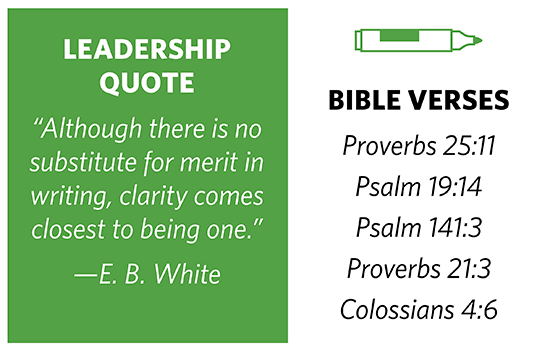
August-
September 2023
Changing World...
Unchanging Mission
------------------
|





The column "Leadership Whiteboard" provides a short visual leadership coaching moment. It introduces and explains a new sketch in each issue, provides leadership coaching for further development, and shares a leadership quote and recommended book.
"It" Matters to the "Thing"
My title probably lost half the readers, and those who chose to dive in did so out of curiosity. Leaders owe listeners and followers clear and understandable communication. When our kids were growing up, my wife and I told them curse words were used by people too lazy to find the correct adjective or adverb.
For example, I hate that blankety-blank car could be better communicated by changing the curse word(s) to: slow, broken-down, tempermental, or unreliable. All communicate a much clearer reason for the individual’s hatred of the car. Leaders use their own lazy vocabulary in the form of generic words.

Using generic words like it, them, this, and thing do not clearly communicate to what you are really referring. At best, listeners will misapply it to the wrong thing, and at worst, they will simply get lost. Confusion and misunderstandings can lead to serious consequences and frustrations. Many followers will not feel comfortable enough to ask for clarity. Instead, they will assume an intended direction only to discover your generic words misled them, resulting in loss of morale.
For example, if you said, “Last Sunday, we had great worship, fellowship, and food for visitors. Our guests found this interesting,” what does this refer to? Worship, fellowship, food, or maybe all of it? Even without multiple options, generic words confuse the listener. Instead of saying, “I don’t like it,” perhaps say, “I don't like this book” (and include the specific title when appropriate). Instead of saying, “They should smile more,” perhaps say, “The greeters at the main entrance should smile more.”
To avoid confusion and misunderstanding, it is crucial to use specific and concrete language that ensures the intended message is conveyed accurately. Ask a colleague to “call you out” each time you use a generic or unclear word. Parents sometimes establish a bad word jar (requiring money each time their child or children say a bad word). Maybe you need a generic word jar.
The more your attention is drawn to vague language, the more you will tamp down the poor habit of lazy speech. Your mind will begin to reach for more precise word choices. Sharpening your communication will enhance the listener’s comprehension, resulting in clearer communication, fewer misunderstandings, and better outcomes in every aspect of life.

|
|

